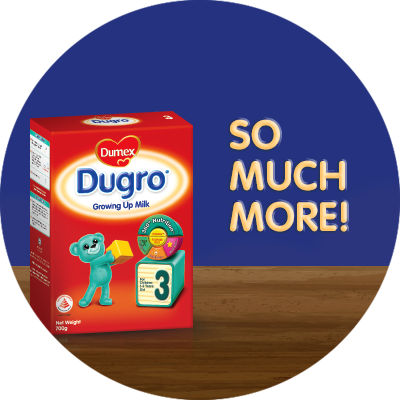Breastfeeding is the best for babies and a healthy diet / maternal nutrition is important when breastfeeding. A decision not to breastfeed can be difficult to reverse. Infant formula is suitable from birth when babies are not breastfed. It is recommended that all formula milks be used on the advice of a doctor, midwife, health visitor, public health nurse, dietitian, pharmacist, or other professional responsible for maternal and child care and the financial implications should be considered. All preparation and feeding instructions should be followed carefully as inappropriate preparation could lead to health hazards.
Developing Your Child's Social Skills
Whether it is your guidance or having the right learning environment, your child needs your support to develop and grow up well. While every child develops social skills at different paces, there are milestones to look out for as well as roles you can play to help your little one develop socially.
FROM ONE TO TWO YEARS OLD
One of the first social skills your child learns is to get your attention with their cries. Your child should show basic interactions like1:
- Smiling when you appear
- Making eye contact with you
- Crying differently for specific needs
At the age of one, they may even attempt to imitate you and understand simple instructions and gestures.
FROM TWO TO THREE YEARS OLD
Your toddler should be able to initiate simple social interactions. Milestones in this stage include2:
- Speaking about 50 words
- Asking simple questions like “Where is daddy?”
- Laughing at funny things
FROM THREE TO FOUR YEARS OLD
Your child is likely to have made friends by now, especially if they attend pre-school or daycare. Teaching them good values and manners is important as they interact with more people outside of the family.
FROM FOUR TO SIX YEARS OLD
By this stage, children should develop empathy and consider the feelings of others better3. Key social milestones you can note in your child include:
- Showing more cooperation with other kids
- Able to empathize and consider the needs of other people
- Hold more complex discussions
Some delays in social development you should note at this stage include:
- Being anxious when separated from you
- Being easily distracted
- Not wanting to play with other kids
- Avoiding eye contact when interacting with others
- Being extremely shy or aggressive
RESPOND, NOT REACT
Imagine a scenario where your child does not make eye contact when being talked to. This can be worrisome as it is a key social development milestone. In situations like these, it’s always better to respond instead of react. To illustrate further, here’s the difference between reacting and responding:
- React: Exclaim out of worry or tell them off, which may discourage your child further from expressing themselves.
- Respond: Ask them why they avoid eye contact, which gives you the opportunity to teach them social skills like empathy and storytelling.
At every stage of your child’s development, you should respond to them as it helps them learn and develop social skills4. As opposed to a reaction which is emotionally triggered, a response is planned with the intention to nurture learning. For example, returning your baby’s smile affirms them to express themselves. Meanwhile, answering your toddler’s curious questions encourages them to be curious and critical in their thinking. All these will help them develop the confidence needed to develop social skills.
BE A GOOD ROLE MODEL
Children learn by imitation, especially from people close to them5. It does not matter if you teach your kid to speak gently but have heated arguments near them. Be conscious to model what you teach them as that will somehow influence how they express and communicate with others.
CREATE A NURTURING LEARNING ENVIRONMENT
Providing your child with a safe learning environment encourages them to express and discover who they are in relation to the world around them. Creating such a learning environment goes beyond a physical setting, requiring you to practice patience and thoughtfulness when interacting with your kid. Some ideas to create such a nurturing space include:
- When they make a mistake, explain (responding) the consequences instead of scolding (reacting to) them
- Answering their questions thoughtfully
- Turning daily routines into lesson games
PROVIDE THE RIGHT NUTRITION
The right nutrition gives your child the energy to learn and interact. An essential nutrient for early childhood learning is docosahexaenoic acid (DHA), which is key for the healthy development of the brain and eyes.
One way to support your child’s nutrition is to feed them with growing up milk formula like Dumex Mamil Gold with no GMOs or colourings. Dumex Mamil Gold also packs a unique prebiotic blend, comprising of galacto-oligosaccharides (GOS) and long chain fructo-oligosaccharides (lcFOS) in a 9 to 1 ratio, which supports your child’s natural defences and gives them the happy tummy needed for learning and social development6.
SUPPORT YOUR CHILD’S DEVELOPMENT
As your child grows up, Dumex Mamil Gold provides them with nutrients to support their development. Contact us to get your free sample or check out https://www.dumex.com.sg/products for more information.
REFERENCES:
Mayo Clinic (2019). Language development: Speech milestones for babies. Retrieved August 29, 2020, from https://www.mayoclinic.org/healthy-lifestyle/infant-and-toddler-health/in-depth/language-development/art-20045163
Parents (n. d.). Improving kids’ social skills. Retrieved August 29, 2020, from https://www.parents.com/kids/development/social/improving-kids-social-skills/
WebMD (2018). 4- to 5-year-olds: Developmental milestones. Retrieved August 29, 2020, from https://www.webmd.com/parenting/4-to-5-year-old-milestones#1
Sielaff, J. (n. d.). Respond to your kids; don’t react. Perspectives Therapy Services. Retrieved August 29, 2020, from https://www.perspectivestherapyservices.com/adolescence-teen/respond-to-your-kids-dont-react/
Stanford Children’s Health (2019). Age-appropriate speech and language milestones. Retrieved 28 July, 2020, from https://www.stanfordchildrens.org/en/topic/default?id=age-appropriate-speech-and-language-milestones-90-P02170
Arslanoglu et al. (2008). Early dietary intervention with a mixture of prebiotic oligosaccharides reduces the incidence of allergic manifestations and infections during the first two years of life. Journal of Nutrition, 138.1091-1095


Ask Our Careline
Whatever’s on your mind, we’re here to help




